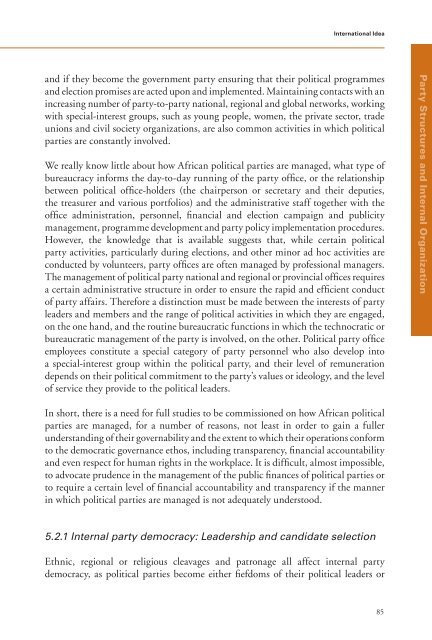Political Parties in Africa: Challenges for Sustained Multiparty
Political Parties in Africa: Challenges for Sustained Multiparty
Political Parties in Africa: Challenges for Sustained Multiparty
Create successful ePaper yourself
Turn your PDF publications into a flip-book with our unique Google optimized e-Paper software.
International Idea<br />
and if they become the government party ensur<strong>in</strong>g that their political programmes<br />
and election promises are acted upon and implemented. Ma<strong>in</strong>ta<strong>in</strong><strong>in</strong>g contacts with an<br />
<strong>in</strong>creas<strong>in</strong>g number of party-to-party national, regional and global networks, work<strong>in</strong>g<br />
with special-<strong>in</strong>terest groups, such as young people, women, the private sector, trade<br />
unions and civil society organizations, are also common activities <strong>in</strong> which political<br />
parties are constantly <strong>in</strong>volved.<br />
We really know little about how <strong>Africa</strong>n political parties are managed, what type of<br />
bureaucracy <strong>in</strong><strong>for</strong>ms the day-to-day runn<strong>in</strong>g of the party office, or the relationship<br />
between political office-holders (the chairperson or secretary and their deputies,<br />
the treasurer and various portfolios) and the adm<strong>in</strong>istrative staff together with the<br />
office adm<strong>in</strong>istration, personnel, f<strong>in</strong>ancial and election campaign and publicity<br />
management, programme development and party policy implementation procedures.<br />
However, the knowledge that is available suggests that, while certa<strong>in</strong> political<br />
party activities, particularly dur<strong>in</strong>g elections, and other m<strong>in</strong>or ad hoc activities are<br />
conducted by volunteers, party offices are often managed by professional managers.<br />
The management of political party national and regional or prov<strong>in</strong>cial offices requires<br />
a certa<strong>in</strong> adm<strong>in</strong>istrative structure <strong>in</strong> order to ensure the rapid and efficient conduct<br />
of party affairs. There<strong>for</strong>e a dist<strong>in</strong>ction must be made between the <strong>in</strong>terests of party<br />
leaders and members and the range of political activities <strong>in</strong> which they are engaged,<br />
on the one hand, and the rout<strong>in</strong>e bureaucratic functions <strong>in</strong> which the technocratic or<br />
bureaucratic management of the party is <strong>in</strong>volved, on the other. <strong>Political</strong> party office<br />
employees constitute a special category of party personnel who also develop <strong>in</strong>to<br />
a special-<strong>in</strong>terest group with<strong>in</strong> the political party, and their level of remuneration<br />
depends on their political commitment to the party’s values or ideology, and the level<br />
of service they provide to the political leaders.<br />
In short, there is a need <strong>for</strong> full studies to be commissioned on how <strong>Africa</strong>n political<br />
parties are managed, <strong>for</strong> a number of reasons, not least <strong>in</strong> order to ga<strong>in</strong> a fuller<br />
understand<strong>in</strong>g of their governability and the extent to which their operations con<strong>for</strong>m<br />
to the democratic governance ethos, <strong>in</strong>clud<strong>in</strong>g transparency, f<strong>in</strong>ancial accountability<br />
and even respect <strong>for</strong> human rights <strong>in</strong> the workplace. It is difficult, almost impossible,<br />
to advocate prudence <strong>in</strong> the management of the public f<strong>in</strong>ances of political parties or<br />
to require a certa<strong>in</strong> level of f<strong>in</strong>ancial accountability and transparency if the manner<br />
<strong>in</strong> which political parties are managed is not adequately understood.<br />
5.2.1 Internal party democracy: Leadership and candidate selection<br />
Ethnic, regional or religious cleavages and patronage all affect <strong>in</strong>ternal party<br />
democracy, as political parties become either fiefdoms of their political leaders or<br />
Party Structures and Internal Organization
















